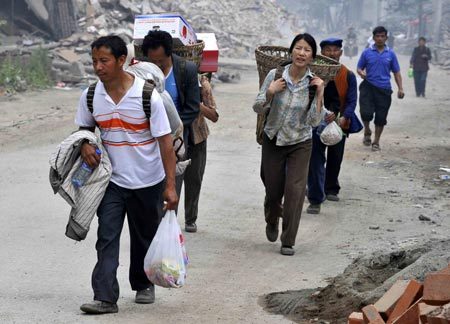
Quake survivors return to their home in Leigu Town of Beichuan County, Southwest China's Sichuan Province, May 24, 2008. [Photo: Xinhua]
Now that the rescue operation following last month's devastating earthquake has ended, the focus has shifted to reconstruction, of an area about the size of Greece or Iceland.
City planners are rushing to make blueprints for community reconstruction while the resources necessary in the massive task, from financial to personnel, are being tapped nationwide to rehabilitate the victims, whose number could exceed Canada's population.
Among the roughly 30 million people affected by the quake, 5 million have lost their homes and are in immediate need of relocation. Direct losses from the quake could amount to 200 billion yuan while indirect losses are still incalculable. Apart from the loss of lives and properties, a good number of public infrastructure such as railways, highways, bridges, power network, communication facilities and water conservancy works have been damaged or even destroyed. It may take months to repair them as recovery efforts have been frequently disrupted by mudslides.
Experts say the reconstruction will require a colossal amount of money. So far, the government has provided 70 billion yuan; the banking regulators have allowed an extra lending quota of about 100 billion yuan for the affected regions; more than 32 billion yuan of donations had been pledged as of last Tuesday; and the Sichuan provincial government is expected to invest heavily in the reconstruction projects.
The total amount that will go into rebuilding the disaster zone could be well above those figures put together since the reconstruction process may last many years. Tangshan, which was hit by an earthquake of 7.8 magnitude in 1976 killing 240,000 people in Hebei province, took 10 years to be completely rebuilt.
The country's sound fiscal condition will ensure adequate funding for the reconstruction, says He Fan, an economist with the Chinese Academy of Social Sciences (CASS).
Fiscal revenues amounted to 5.13 trillion yuan last year, up more than 30 percent year-on-year. Revenues are expected to increase to more than 6.4 trillion year this year, says Liu Yuanchun, economist and head of the School of Economics at the Renmin University of China. "Therefore the funding demand can be met by adjusting the government expenditure structure and using private donations."
"In the worst-case scenario (in the event of fiscal difficulties), China can use financial instruments such as a 30-year special quake treasury to pool money," says He from CASS. "In this way, it can spread out the fiscal pressure."
Agrees Li Xiaoxi, a senior economist with the Beijing Normal University, who says the government can also design policies to woo private investors to participate in the reconstruction.
Li Ke, a professor with the business school of Japan's Nihon University, says although government-led efforts are important, the market should be fully utilized. Although the local economy of Sichuan is comparatively underdeveloped compared with major economic belts such as the Yangtze River Delta, it has its own competitive edge, such as its tourism, thanks to its beautiful natural scenery. Both Dujiangyan and Wolong, severely damaged in the quake, are famous tourist destinations.
"The BOT (buy-operate-transfer) model could be explored in reconstruction in those regions," Li says. Under the BOT model, private developers are contracted to finance the cost of the reconstruction in exchange for which they are allowed to operate local tourism resources for a set period of time, say 10 years, before transferring them to the local government. In this way, the local infrastructure could be restored and jobs created while bridging the funding gap, if any, Li adds.
Minister of Civil Affairs Li Xueju has reportedly said his ministry is planning to launch a relief lottery nationwide to pool money for quake-hit regions.